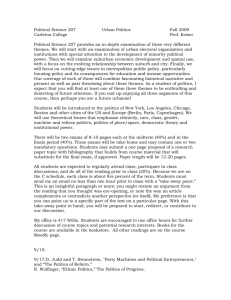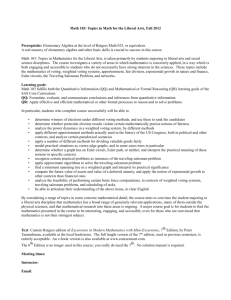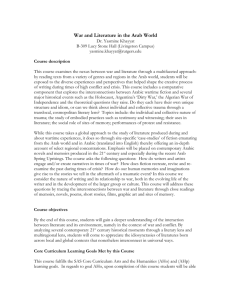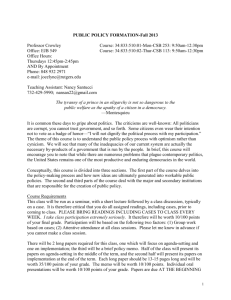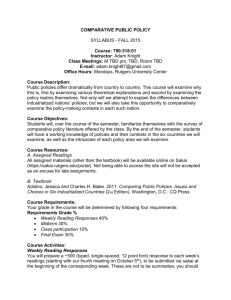Nature of Politics - Department of Political Science
advertisement
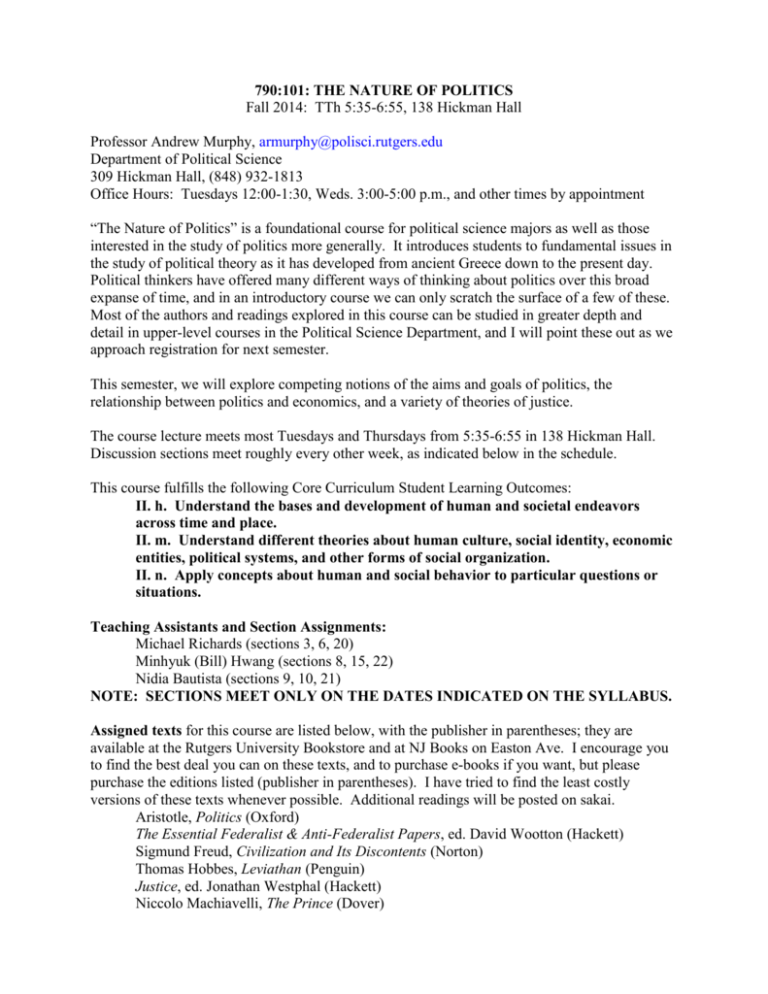
790:101: THE NATURE OF POLITICS Fall 2014: TTh 5:35-6:55, 138 Hickman Hall Professor Andrew Murphy, armurphy@polisci.rutgers.edu Department of Political Science 309 Hickman Hall, (848) 932-1813 Office Hours: Tuesdays 12:00-1:30, Weds. 3:00-5:00 p.m., and other times by appointment “The Nature of Politics” is a foundational course for political science majors as well as those interested in the study of politics more generally. It introduces students to fundamental issues in the study of political theory as it has developed from ancient Greece down to the present day. Political thinkers have offered many different ways of thinking about politics over this broad expanse of time, and in an introductory course we can only scratch the surface of a few of these. Most of the authors and readings explored in this course can be studied in greater depth and detail in upper-level courses in the Political Science Department, and I will point these out as we approach registration for next semester. This semester, we will explore competing notions of the aims and goals of politics, the relationship between politics and economics, and a variety of theories of justice. The course lecture meets most Tuesdays and Thursdays from 5:35-6:55 in 138 Hickman Hall. Discussion sections meet roughly every other week, as indicated below in the schedule. This course fulfills the following Core Curriculum Student Learning Outcomes: II. h. Understand the bases and development of human and societal endeavors across time and place. II. m. Understand different theories about human culture, social identity, economic entities, political systems, and other forms of social organization. II. n. Apply concepts about human and social behavior to particular questions or situations. Teaching Assistants and Section Assignments: Michael Richards (sections 3, 6, 20) Minhyuk (Bill) Hwang (sections 8, 15, 22) Nidia Bautista (sections 9, 10, 21) NOTE: SECTIONS MEET ONLY ON THE DATES INDICATED ON THE SYLLABUS. Assigned texts for this course are listed below, with the publisher in parentheses; they are available at the Rutgers University Bookstore and at NJ Books on Easton Ave. I encourage you to find the best deal you can on these texts, and to purchase e-books if you want, but please purchase the editions listed (publisher in parentheses). I have tried to find the least costly versions of these texts whenever possible. Additional readings will be posted on sakai. Aristotle, Politics (Oxford) The Essential Federalist & Anti-Federalist Papers, ed. David Wootton (Hackett) Sigmund Freud, Civilization and Its Discontents (Norton) Thomas Hobbes, Leviathan (Penguin) Justice, ed. Jonathan Westphal (Hackett) Niccolo Machiavelli, The Prince (Dover) Karl Marx, The Communist Manifesto (International) Adam Smith, The Wealth of Nations (Dover); possibly out of print; if so, will be online. Grading is determined as follows: Midterm exam (includes in-class and take-home portions): 30% Final exam (includes in-class and take-home portions): 40% Attendance and participation in biweekly discussion/recitation section: 30% (includes occasional quizzes, brief writing assignments, etc.) Grading rubric for all written work submitted in this course A B C Argument/Analysis Makes clear Makes clear Attempts to and argument, offer a compelling based on cogent argument. plausible argument and Solid readings. Some analysis, but reasoning. effort to sustain argument and Offers argument analysis are insightful throughout the based on analysis analysis. faulty reasoning. Writing/Grammar Well-written. Well-written, Multiple Appropriate but may errors, but word choices. include a still clearly Free of handful of intelligible. grammar and grammar, spelling spelling, or mistakes. word choice mistakes. Organization/Structure Clear, easy to Clear Some effort follow organization to structure organization with some road he paper, but with intro, map for reader. organization body, is conclusion. problematic Provides or difficult to reader with a follow. “road map” of essay. Use/mastery of Uses multiple References Minimal use readings readings and multiple of readings demonstrates readings and and/or failure mastery of demonstrates a to facts and good degree of demonstrate arguments understanding. adequate made in mastery of readings. readings. D/F Failure to make a cogent argument or to offer sound analysis. Multiple errors that interfere substantially with comprehension. Disorganized and difficult or impossible to follow. Failure to use readings Course policies and information Attendance and participation in your biweekly discussion section is mandatory, and you must regularly attend section in order to pass the course. Any student missing more than two section meetings will not pass the course. Part of your section grade will include various announced and unannounced quizzes and brief written assignments. Submission of a complete midterm and final exam is required to pass the course. Please note the University’s policy on disability accommodations. I will gladly make accommodations for any student who needs them, though I ask that students work with the Office of Disability Services (dsoffice@echo.rutgers.edu). Their website is at http://disabilityservices.rutgers.edu/ Please note the University’s policy on academic integrity and plagiarism: http://academicintegrity.rutgers.edu/policy-on-academic-integrity I encourage you to discuss the course readings, the issues that they raise, and your own assessments of them with your classmates both in and outside of class. But all work turned in with your name on it must be your own. You are responsible for familiarizing yourself with, and abiding by, the University’s academic integrity policy, which is available online at http://academicintegrity.rutgers.edu/policy-on-academic-integrity. TAs will discuss issues of academic integrity with their sections. I also suggest that you visit http://www.scc.rutgers.edu/douglass/sal/plagiarism/intro.html and view the library’s plagiarism tutorial. Plagiarism will not be tolerated in this course, and violations of academic integrity will be handled personally by the professor and prosecuted through the Office of Student Conduct. The take-home (essay) portions of both exams will be submitted via the Sakai system, which processes all student papers through an antiplagiarism database. Please note also the University’s policy on religious observances: It is University policy (University Regulation on Attendance, Book 2, 2.47B, formerly 60.14f) to excuse without penalty students who are absent from class because of religious observance, and to allow the make-up of work missed because of such absence. Examinations and special required out-of-class activities shall ordinarily not be scheduled on those days when religiously observant students refrain from participating in secular activities. Absences for reasons of religious obligation shall not be counted for purposes of reporting. You should consider yourself excused when class falls on a religious holiday that you observe. You must, however, inform your TA in advance of such an event, and you must make up any class notes or assignments that you miss. Laptops in the classroom. Laptops are wonderful things. I use mine every day. Unfortunately, many students use them to engage in activities that detract from their own educational experience or that of other students. As a result, I restrict the use of laptops to the first five rows of the lecture hall. If you wish to use a laptop to take notes during lecture you must sit in the front four rows and may not browse the Internet or engage in other non-class-related online activities during class time. Permission to use laptops in class is a privilege, not a right, and it can be taken away. Announcements and course information will be posted to the course sakai site and at times sent via email to the class email list. The system automatically sends email to your official Rutgers address. If you don’t know this email address, please find out and be sure to check it regularly. You can set up email forwarding to whichever address you prefer, but we will send to your Rutgers email address of record. Tentative schedule of readings Specific reading assignments will be announced either in lecture or by TAs in sections. Date Reading T 9/2 Introduction to course: Political theory and the study of politics The Ends and Goals of Politics Th 9/4 Aristotle, Politics Book I, chs. 1, 2, 3, 5, 6, 13 Book III, chs. 1, 2, 4-9, 11, 12 Book IV, chs. 1, 2, 4, 8, 9, 11 T 9/9 Aristotle, Politics Book V, chs. 1, 9 Book VII, chs. 1, 2-5, 13-15 NO LECTURE THURSDAY 9/11 SECTIONS MEET TUES 9/9 AND WEDS 9/10 T 9/16 Niccolo Machiavelli, The Prince, Dedicatory Letter through ch. 13 Th 9/18 Machiavelli, The Prince, chs. 13-26 T 9/23 Thomas Hobbes, Leviathan, Introduction Part I: chs. 1-9, 11-16 Part II: chs. 17-19, 21 Th 9/25 Hobbes, Leviathan Part II: chs. 24, 29-31 Review and Conclusion T 9/30 Sigmund Freud, Civilization and its Discontents, chs. 1-4 SECTIONS MEET TUES 9/30 AND WEDS 10/1 NO LECTURE THURSDAY 10/2 T 10/7 Sigmund Freud, Civilization and its Discontents, chs. 5-8 Th 10/9 The Essential Federalist and Anti-Federalist Papers Speech of Patrick Henry (pp. 25-41) Cato 4, 5 (58-65) Brutus 6, 11 (74-86) T 10/14 Essential Federalist and Anti-Federalists Federalist Papers TBA NO LECTURE THURSDAY 10/16 SECTIONS MEET TUES 10/14 AND WEDS 10/15 T 10/21 In-class portion of midterm exam; take-home/essay portion due to Sakai 12 noon, Saturday, October 25 Politics and Economics Th 10/23 Adam Smith, The Wealth of Nations (selections TBA) T 10/28 Smith, Wealth of Nations Th 10/30 Karl Marx, Preface to “Contribution to the Critique of Political Economy” (Sakai) Marx, The Communist Manifesto, Parts I and II Marx, selections from “The German Ideology” (Sakai) T 11/4 Marx, “To Each According to his Needs” (Justice reader) NO LECTURE THURSDAY, NOVEMBER 6 SECTIONS MEET TUESDAY 11/4 AND WEDNESDAY 11/5 Justice (all readings from Hackett Justice reader except where noted) T 11/11 Plato, Republic (selection, Sakai) Th 11/13 Martin Luther King, Jr., “Letter from Birmingham Jail” (Sakai) T 11/18 John Rawls, “Principles of Justice” John Hospers, “What Libertarianism Is” (Sakai) NO LECTURE THURSDAY, NOVEMBER 20 SECTIONS MEET TUESDAY 11/18 AND WEDNESDAY 11/19 T 11/25 Martha Nussbaum, “Beyond the Social Contract: Toward Global Justice” (Sakai) Amartya Sen, The Idea of Justice, selection (Sakai) NO LECTURE THURSDAY 11/27 – THANKSGIVING BREAK T 12/2 Iris Marion Young, “Democracy and Justice” (Sakai) Th 12/4 Mill, “On the Connexion Between Justice and Utility” T 12/9 Hans Kelsen, “What is Justice?” Course wrap-up FINAL EXAM: FRIDAY, DECEMBER 19, 8:00 A.M. TAKE-HOME PORTION OF FINAL EXAM DUE TO ASSIGNMENTS TAB ON SAKAI, NO LATER THAN 9:00 P.M., FRIDAY, DECEMBER 19. YOU ARE ENCOURAGED, BUT NOT REQUIRED, TO SUBMIT IT BEFORE THE DEADLINE.






